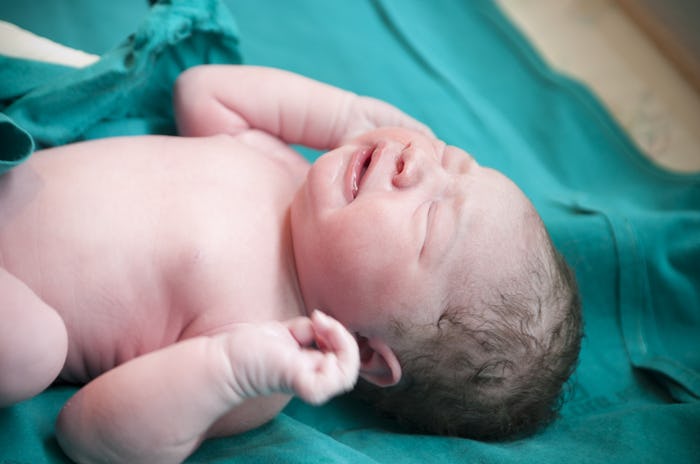Life
This Birth Injury May Increase A Child's Mental Illness Risk, New Study Finds
Sometimes, during labor, a baby may be injured physically. In many cases, a birth injury may happen because of a mother's pelvic size or shape, or the baby's size or position during labor and delivery. Often, birth trauma doesn't have a short- or long-term impact on an infant's health. But new research has discovered that one common birth injury may increase a child's mental illness risk in their teen years.
A new Swedish study published Wednesday in PLOS One found that children with brachial plexus birth injury (BPBI) — a condition where the nerves leading to the arms and hands are damaged — have a higher risk of developing a mental health issue as teenagers, according to PsychCentral. In particular, researchers from Lund University in Sweden analyzed data on more than 600,000 Swedish kids and discovered that nearly 1,600 with BPBI, also known as brachial plexus palsy, used anti-depressants and other medications treating mental health problems more frequently than their peers, PsychCentral reported.
What's more: Researchers found that kids with brachial plexus palsy who come from low-income families have a greater chance of developing mental health issues than their wealthier counterparts. And, while teenage girls overall were more affected, the risk became more severe for young girls from low-income backgrounds, according to the study's findings.
Lead study author Elia Psouni, associate professor of developmental psychology at Lund University in Sweden, told PsychCentral of the findings:
Coming from a family with low socioeconomic status is a high risk in itself. If you are also a girl, the risk that you will suffer from poor mental health is more than twice as high than if you are a boy from a wealthy family.
A large body of research has shown that a youth's socioeconomic background can increase their chances of developing a mental illness. A 2005 American Journal of Orthopsychiatry study found that economic stress and hardship experienced by low- and middle-income families can exacerbate mental health issues, which would explain the association. Another study, published in 2012 in The American Journal of Public Health, revealed that the link between adolescent mental health disorders and socioeconomic background may be mostly driven by perceived social status. Children raised in low-income households also receive less support and have less access to services.
But why does the birth injury's impact on mental illness risk disproportionately affect girls, as Psouni's new study has found? The Swedish researcher said "it has to do with trauma and discrimination on many levels," according to PsychCentral.
She continued:
In my previous research, I have seen how the experiences and consequences of school-related stress are greater in girls than in boys.
Some of the more common birth injuries, such as brachial plexus palsy, are treatable. Brachial plexus birth injury causes a baby to lose the ability to flex and rotate their arm, but movement typically returns within a few months, according to Stanford Children's Health. Still, it is possible that nerve tearing may result in permanent nerve damage, which would be treated by special exercises to help maintain range of motion.
Birth injuries are preventable, though. Although, in some cases, injuries be unavoidable, greater care taken by health care providers when selecting and managing treatment, or helping parents-to-be take the right measures during pregnancy to avoid birth complications can reduce the rates.
Nevertheless, Psouni said that she wants the research will increase awareness of the long-term effects of brachial plexus birth injury, as well as better prepare and support children with BPBI when it comes to their mental well-being in their teen years. She told PsychCentral she hopes "children will continue to receive help, even after the physical injury has been treated, by a professional team working closely with the patient."
Check out Romper's new video series, Bearing The Motherload, where disagreeing parents from different sides of an issue sit down with a mediator and talk about how to support (and not judge) each other’s parenting perspectives. New episodes air Mondays on Facebook.
